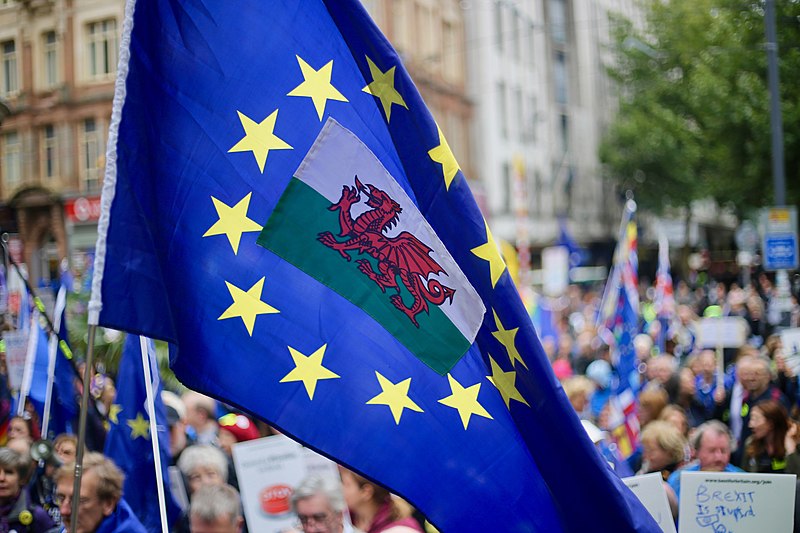Geraint Talfan Davies calls for Remain-backing parties to collaborate on a cross-party referendum campaign
This article was originally published in the Western Mail on 29 May 2019
When the Brexit saga comes to be written – on the assumption that it will ever end – the last week will have a chapter of its own:
- the defenestration of a tearful Theresa May and the launch of yet another Tory beauty parade;
- a crowing victory parade by the Farageists and the utter humiliation of the so-called ‘natural party of government’;
- a scarcely less humiliating defeat for Labour, with Plaid Cymru beating it in a national election in Wales for the first time in nearly 100 years;
- and, within days, the sound of a dull thud as the Labour leadership in London and Cardiff finally falls off the tightrope of ambiguity to allow the party become what the majority of its members have always wanted it to be, a party of Remain.
The stage is being reset for a new act in the UK’s long-running European drama. Are the prospects for a happy ending any better than they were? Let’s deal with the figures first. The Brexit Party may have won the largest single vote in Wales, in an election structured along party lines. But it is still a minority position. That said, one should never underestimate the speed and effectiveness of the Brexit Party operation. It conveys a precise message and has money and skill behind it. Complexity, it implies, is for the birds. However, across the UK, the avowedly Leave parties took 35% of the vote, while the avowedly Remain Parties took 40%. In Wales the figures were 35.8% and 42.4%. In terms of votes cast the Remain parties in Wales secured 354,805, and the Leave parties 298, 970, a Remain lead 55,835.
But this is to put aside the Conservative and Labour votes. If the Conservative vote is thrown in on the Leave side, and Labour for Remain, then the Leave vote rises to 353,557, but the Remain vote rises to 482,638, a difference of 129,081 – in percentage terms that would be 42-58 in favour of Remain. One cannot be sure that all Conservative voters are Leavers, nor that all Labour voters are Remainers, but any differences may be self-cancelling. One can be pretty certain that, in the light of last week’s elections – and given other polling – Wales is now undoubtedly, in the words of Adam Price, a Remain nation. Opinion in Wales has shifted markedly to a Remain position. I say markedly, because it would be tempting providence to say decisively. Caution is still needed. The turnout in elections to the European Parliament – though higher last week than in 2014 – is usually substantially lower than in general elections or in a major referendum. On the other side of the coin, the dynamics of a referendum are helpfully different from those of party based elections. But however much encouragement one can take from this result, there is absolutely no room for complacency.
First of all, a new referendum has to be secured, and there is every sign that the Conservative leadership election will not make that any easier. We are likely to end up with a Prime Minister more committed to a harder Brexit than Mrs May came to espouse. There was much self-deception evident in Theresa May’s valedictory speech in Downing Street as she attempted unsuccessfully to scrape together a respectable sounding legacy. The country and the policy achievements she described are not ones that many citizens will recognise. But self-deception has also been evident in the words of contenders for the Tory leadership, many of whom – in the predictably over-simple soundbites of campaign language – see few problems in our leaving the EU with ‘no deal’ and, for good measure, imagine that public services already reduced to penury will be helped by further tax cuts.
There has already been too much easy talk about a ‘no deal Brexit’ and many are rightly concerned that, legally, it may be the default position. The consequences in Wales would be devastating, and it is inconceivable that a government could take us down that catastrophic road against the clearly declared wishes of Parliament. Surely our democracy, whatever its weaknesses, has not yet atrophied to that extent.
A new referendum could never be secured in Parliament without the support of the main Opposition party. Thankfully, there are now signs of real movement, not only from Wales’s First Minister, Mark Drakeford, but also from the UK leadership. In line with his preference for following rather than leading, Jeremy Corbyn reserved his own shift until Keir Starmer, Emily Thornberry, his shadow chancellor, John McDonnell and even his deputy Tom Watson had made it clear the days of obfuscation had to come to an end. In Wales, the First Minister has had the motive, the freedom, the authority and the duty to mark out a distinct Welsh position. On the back of last week’s vote, it is welcome that he has now decided to do so. It is to be regretted that all these shifts did not take place a week ago, but it is better late than never and at least starts to mark out the ground for battle.
Mr Corbyn will no doubt want the shift to be sanctified by a conference decision. If so it would be a huge mistake to defer any decision to the autumn. That would allow the Tory leadership debate to command the airwaves for the next two months, implanting a different set of choices into the public mind. The Remain parties need too counter that quickly. The distraction of the Tory leadership election also creates the space for the Remain parties to start discussing the mechanics of a cross-party referendum campaign. We cannot afford the fragmentation of effort and the narcissism of small differences that was evident in this election, and of which there are many signs in the profusion of Remain campaign organisations
Whatever arrangements are made at the UK level, in Wales there is a need to clarify how the parties will collaborate, how the campaign will be led and by whom, and what the key messages will be. Last time round the devil has the best tunes. We cannot let that happen again. Time is short. Let’s not forget that this is a European issue and the patience of the other 27 EU leaders cannot be relied upon for ever.
Put yourself in their position. While you are coping with the many problems of your own country as well as the ongoing challenges to the Union of which you are part, a member that voted to leave all of three years ago, and that has commandeered far too much of your time and attention since then, has now had the effrontery to park its central self-created problem so that it can indulge in a leadership contest for its governing party. Not content with this selfishness, the recalcitrant member then plans to take a month’s holiday, before returning for a short resumption of normal hostilities prior to another three-week break, this time for its own party conferences. So, of the five months left before the latest deadline to leave the Union – 31 October – the UK intends to be absorbed with its various domestic processes for no less than four of them.
In such a situation, surely, the 27 leaders may be forgiven for feeling, at best perplexed and at worst completely bloody exasperated. And we think they have been awkward.
All articles published on Click on Wales are subject to IWA’s disclaimer





